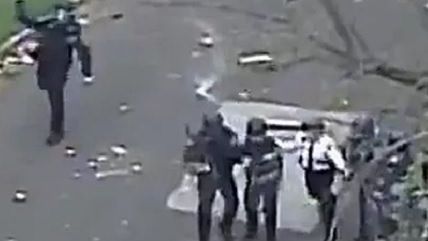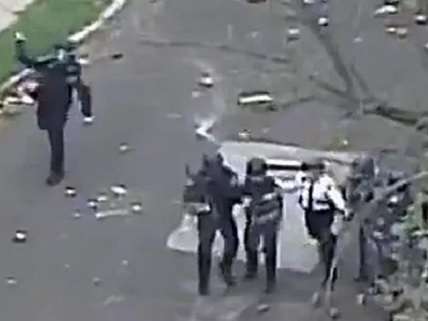Rioting Is a Threat to Public Safety. Police Unions Are a Worse One.
How much does a lack of police accountability and transparency contribute to the anger that helps turn protests violent?


Protests in Baltimore over the Freddie Gray's unexplained death while in police custody from a fatal spine injury are turning violent. As usual, authorities blame outsiders for the violence, a spurious claim.
In a press conference Saturday, Baltimore Mayor Stephanie Rawlings-Blake said the city "gave those who wished to destroy space to do that as well." Today, her spokesperson insisted the mayor didn't mean she give room for vandals to destroy, but that in providing space for peaceful protests, space is inevitably provided, too, for rioters. Another spurious claim.
Nevertheless, it ought to go without saying that assaulting residents and destroying residential or commercial property has nothing to do with the cause of police reform. Perhaps the destruction of police property does, and there's been a bit of that too. Authorities say at least seven cops have been injured so far.
The protests turned violent this weekend, about a week after Freddie Gray's death. Initially protests were exclusively peaceful. But at that time, the police union compared protesters to a "lynch mob" because some protesters were allegedly calling for the six officers involved in Gray's arrest, who have been suspended with pay, to be "imprisoned immediately." The union, of course, insisted there had been no criminal wrongdoing on the part of the officers.
Yet there are still few answers as to why Gray died. Those who could provide answers—the six cops involved—have union privileges that protect them from answering questions about Gray's death immediately. In fact they have 10 days to do so. It's a frustrating reality. Someone is dead and the people who could be responsible, and who are in fact charged with enforcing the law on the rest of us, aren't having the law enforced on them in the same way. Not only that, but after someone died while in their custody, they continue to draw paychecks paid for by city taxpayers.
None of this justifies violence against residents or the destruction of personal or commercial property, but it should provide some perspective as to why there's so much anger. That anger, in turn, provides cover to the kind of element that would enjoy a good riot whether or not that anger existed. There are people who would riot given any excuse—it's why riots are so common after sports championships, and the kind of anger elicited by the total lack of accountability for the death of Freddie Gray provides similar cover.
Incidents of police violence tend to become so controversial because of the lack of accountability and transparency even when the incidents may not be questionable. In many jurisdictions, thanks to union and other protections, it's very difficult to fire a cop.
Last year, a former Baltimore police officer sued the police department for allegedly failing to protect him when he tried to report a fellow officer for brutality. The city of Baltimore hasn't acknowledged a problem exists but is instead fighting the allegations in court. City council meetings about the Baltimore police tend to be full of complaints about the police department. Baltimore's political leaders insist they are improving the police department and have in the past been resentful of residents who question that claim.
But the city is limited in what it can do to improve its police department, largely because of the union rules protecting cops. It took three years (!) for the department to be able to fire a cop who berated a teenaged skateboarder in an incident caught on video.
Are the six officers who arrested Freddie Gray criminally responsible for his death? That's up to a judge and jury to decide. But the absence of a conviction should not preclude termination. Baltimore's mayor appeared to claim police-community relations were improving prior to Gray's death. That's doubtful. Firing the cops involved in his death, rather than giving them a paid vacation, could go a long way to improving those relations. Union protections prevent it. Requiring the cops involved in Gray's death to answer investigators' questions immediately might've gone a long way to prevent today's violence. Union protections prevent it.
The union called peaceful protesters a "lynch mob" days before the first protester hurled the first rock at a Baltimore cop. How much has the Baltimore police union contributed to the current situation in Baltimore. And if police union rules prevent the city from dismissing bad cops or cops whose actions harm police-community relations, aren't they a threat to public safety?


Show Comments (86)